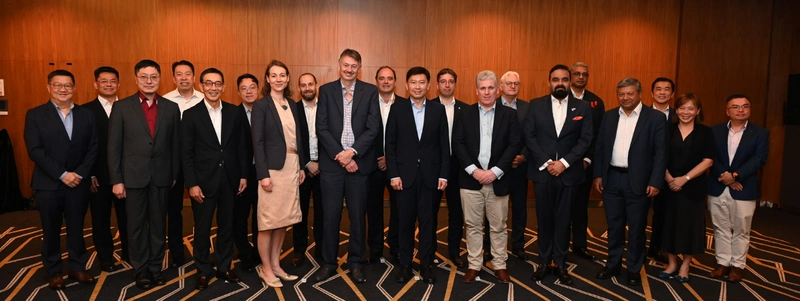Advanced Digitalization Discussed at Singapore Maritime Week
The Maritime International Advisory Panel (IAP) held its third annual meeting on April 16, 2024, during the Singapore Maritime Week 2024. This year, the Maritime IAP held in-depth discussions on the key developments in the maritime sector, including decarbonization, green financing, digitalization and cybersecurity.
Established in 2022 by the Ministry of Transport (MOT) and the Maritime and Port Authority of Singapore (MPA), the Maritime IAP aims to seek international perspectives on key long-term trends and developments that will shape the maritime industry. It comprises global leaders from the maritime sector, adjacent industries and academia, and is chaired by Chee Hong Tat, Minister for Transport and Second Minister for Finance. Local industry and union leaders also joined the meeting to share their perspectives.

The Maritime IAP highlighted that despite geopolitical uncertainties and supply chain shifts, there were significant opportunities for the global maritime sector in the following areas:
• Accelerating the green transition towards a low- and zero-carbon future, supported by important enablers such as financing for green shipping;
• Deepening the utilization of technology and digitalization while strengthening cyber resilience; and
• Training and re-skilling the maritime workforce to take on the new job opportunities of the future.
Singapore’s position as a trusted and established maritime eco-system could catalyze green financing solutions, unlock the benefits of deeper utilization of technology and data, and position it as a training hub to develop the skills needed by the future maritime workforce.
Against the backdrop of global uncertainties, the Maritime IAP highlighted that Singapore could be an important trade and maritime intermediary, given its status as a neutral, trusted, and leading maritime hub. With growing trade to emerging regions as trade flows shifted, the panel believed Singapore would be an important conduit for new trades going forward. The panel further suggested for Singapore to become a trusted maritime technology hub for the development, installation, and accreditation of critical technologies, especially for those fitted onboard ships.
The Maritime IAP noted that amidst the ongoing green transition, there would be competing demands for various low- or zero-carbon fuels (e.g. hydrogen, ammonia, methanol) from other sectors.
The Maritime IAP highlighted the need to draw on a wide range of green financing instruments and investments to catalyze change, address hurdles and accelerate the sector’s green transition. The panel also noted that financial institutions were willing to provide lending for suitable projects to support maritime decarbonization with sufficient assurance that the default risks were managed. To address the financing needs of the sector, the panel suggested for maritime stakeholders to pool their needs, while demand aggregation would help smaller companies gain better access to suitable solutions and financing, and also allow financial institutions to better determine and manage the risks involved.
The Maritime IAP discussed the importance of further harnessing new technologies, such as generative artificial intelligence (GenAI), in the maritime domain to reap greater productivity, efficiency, safety and sustainability. Clear use cases included autonomous shipping, vessel collision avoidance, ship-to-shore connectivity, and drone services. The Maritime IAP highlighted the significant potential to utilize data in the maritime domain for multiple uses and benefits, including optimizing vessel voyage planning and energy consumption, and for trade and offsetting uses in the carbon markets. Digital twins should be leveraged to anticipate future crisis and futureproof assets as well as develop preparedness and response capabilities.
The Maritime IAP stressed the necessity of cybersecurity and cyber-resilience as digitalization of the maritime industry grew and maritime systems became more inter-linked. An eco-system approach was needed as incidents in the maritime sector could have regional and global implications; entities could not afford to work in silos.
Beyond technical competencies, there was a need to encourage information-sharing between entities and inculcate a culture where high cyber standards and hygiene were ingrained at all levels. The Maritime IAP noted that cybersecurity resilience involved regular risk assessments, mapping of digital assets, and developing an inventory of all information technology and operational technology assets within each organization.
The Maritime IAP recommended that Singapore as a maritime hub could forge regional and global partnerships in technology development and cyber-resilience, in the areas such as operations (e.g. information sharing about threats and mitigation measures), technology (e.g. test lab for solutions and inter-operability platforms), standardization of relevant regulations and standards and development of cybersecurity talent pipeline.
The Maritime IAP, as well as local industry and union representatives, underscored the importance of investing in attracting, developing, and retaining the talent pool in the maritime industry. As the industry pursued the green transition as well as digitalization and automation, the Maritime IAP recommended establishing clear and regular communication with the maritime workforce on the need for upskilling, re-skilling and job redesign in advance. Governments and industry should also collaborate with academic institutions to ensure that curricula continued to be updated with the relevant skills required in the maritime sector for the workforce to be future-ready.
